Related Research Articles
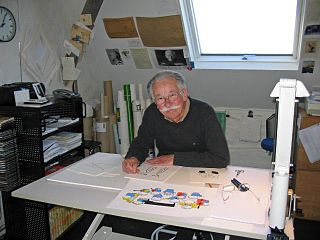
Dick Bruna was a Dutch author, artist, illustrator and graphic designer.

Marius Job Cohen is a retired Dutch politician and jurist who served as Mayor of Amsterdam from 2001 to 2010 and Leader of the Labour Party (PvdA) from 2010 to 2012.

The Gouden Griffel is an award given to authors of children's or teenagers' literature in the Netherlands.
The Stripschapprijs is a Dutch prize awarded to comic creators for their entire body of work. It is awarded annually by the Stripschap, the Dutch Society of comics fans, since 1974. The prize is non-pecuniary, but is considered the most important award for comics in the country.
The Anne Vondeling prize, named after the politician Anne Vondeling a member of the Dutch Labour Party, is an annual award in The Netherlands given to journalists who write in a clear manner concerning political subjects.

The P.C. Hooft Award, inaugurated in 1948, is a Dutch-language literary lifetime-achievement award named after 17th-century Dutch poet and playwright Pieter Corneliszoon Hooft. The award is made annually.

The Ministry of Housing and Spatial Planning is a Dutch government ministry. It was re-established in 2024 after having been disbanded in 2010. The current minister is Mona Keijzer.

Geert Meijer is a Dutch football manager and former professional player.

Weesperplein is an underground metro station in the city centre of Amsterdam, Netherlands. Served by lines 51, 53, and 54 of the Amsterdam Metro, it was constructed using caissons with a length and width of 40 metres (130 ft). It has two floors: the upper floor, with a station hall and stores, and the lower floor, containing the tracks. Construction started in August 1970, and the first test rides passed through in January 1977. Extensive tests were carried out in September that year before it opened on 16 October.
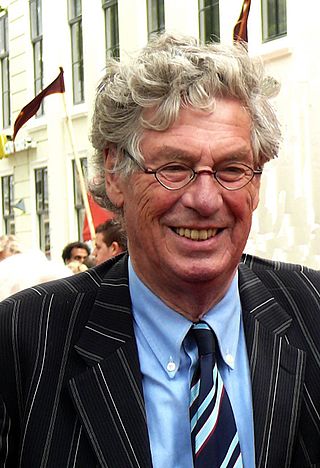
Peter van Straaten was a Dutch cartoonist and comics artist. He is best known for his political cartoons as well as his satirical observations of everyday people. He also had a newspaper comic strip Vader & Zoon, which ran in Het Parool for almost two decades.
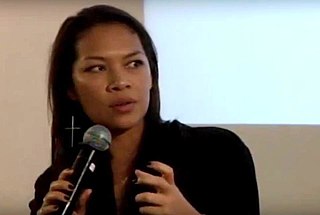
Karin Amatmoekrim is a Surinamese writer. She has written five novels and won the 2009 Black Magic Woman Literature Prize for Titus and was awarded the 2024 Dutch biography prize for In wat voor een land leef ik eigenlijk?, a biography on Anil Ramdas.

Arendo Joustra is a Dutch writer and journalist.
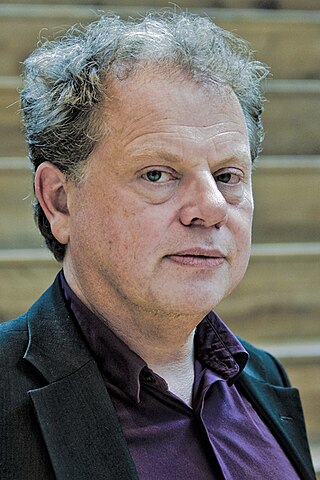
Bastiaan Johan "Bas" Heijne is a Dutch writer and translator.
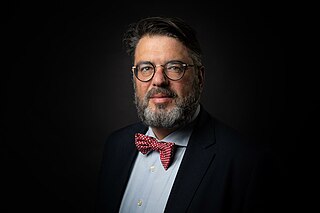
Robbert Baruch is a Dutch lobbyist, public administrator and former PvdA politician in the Netherlands. From 2006 to 2009 he was the Deputy Mayor and Alderman on behalf of the PvdA in the Rotterdam borough of Feijenoord. From 2012 to 2021 he was Manager Public Affairs in Buma/Stemra. In 2021 Baruch held the role of Senior Vice President Public Affairs, Europe to Universal Music Group (UMG).
Daniël (Daan) van Golden was a Dutch artist, who has been active as a painter, photographer, collagist, installation artist, wall painter and graphic artist. He is known for his meticulous paintings of motives and details of everyday life and every day images.
The Ida Gerhardt Poëzieprijs is a Dutch poetry award named after classicist and poet Ida Gerhardt. The award was created by the municipal council of the city of Zutphen and is now awarded by the Stichting Ida Gerhardt Prijs. The award was created in 1998 and first awarded in 2000.
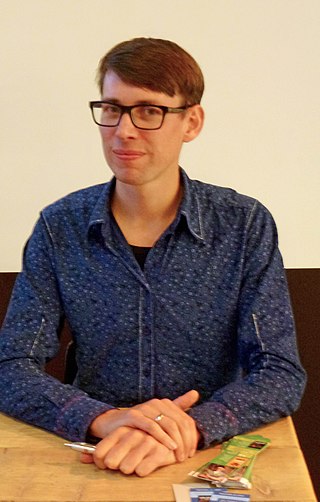
Simon van der Geest is a Dutch writer and poet.

Bart Chabot is a Dutch writer and poet.
The Libris History Prize rewards history books originally written in Dutch, that appeal to a general audience. Originality, readability and historical soundness are the most important criteria. Established in 2007, it is awarded annually since 2009 by Libris, an association of independent Dutch booksellers, and amounts to €20,000 for the winner. All applications go through a selection process out of which a longlist of ten books are selected and announced. Subsequently, another selection round takes place which nominates a shortlist of the five best books. The author of each shortlisted book receives €1,500. Typically, the (independent) jury's selection is discussed and criticized in the Dutch press.
References
- ↑ "Pieter van Os wint Brusseprijs voor het beste journalistieke boek". 13 June 2020.
- ↑ Os, Pieter van (8 September 2022). Hiding in Plain Sight | Book | Scribe UK. ISBN 9781913348892.
- ↑ "Pieter van Os wint Libris Geschiedenis Prijs met Liever dier dan mens". 25 October 2020.
- ↑ "Over Pieter van Os". Vrij Nederland. 7 January 2008.
- 1 2 3 Jong, Laura de (2020-10-25). "Om de verschrikkingen van de oorlog te beschrijven liet Pieter van Os zich inspireren door kinderen". de Volkskrant (in Dutch). Retrieved 2022-08-26.
- ↑ "Prof. Dr. H.W. (Henk) van Os". 8 March 2021.,
- ↑ Van Walsum, Sander (10 April 2020). "De laatste oorlogsgetuigen doen hun verhaal, maar is hun geheugen nog wel zo betrouwbaar?". Volkskrant. Volkskrant. Retrieved 24 August 2022.